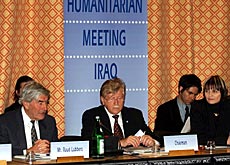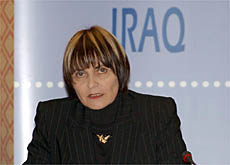Humanitarian aid conference focuses on security

The Swiss Agency for Development and Cooperation (SDC) has made security the key theme at its annual humanitarian aid conference.
Opening the conference, SDC director Walter Fust defined security as a basic human need, and said that humanitarian aid and development played a vital role in promoting security.
Swiss Foreign Minister Micheline Calmy-Rey gave a keynote speech to the conference, in which she called for the development of a worldwide culture of peace.
And she warned once again against the consequences of war in Iraq, saying it would not increase global security but would instead fan the flames of international terrorism.
Iraq dominates
The impending war in Iraq dominated the conference; although aid workers stressed that they still hoped conflict could be avoided, aid organisations are now extremely busy making contingency plans.
Toni Frisch, head of SDC’s humanitarian aid section, has just returned from a fact finding mission to Baghdad, where he said, he found conditions on the surface at least, surprisingly normal.
“I was impressed by how unchanged everything seemed to be at first,” Frisch told swissinfo. “But when you talk to people it becomes clear that they are very frightened of what may happen.”
Frisch said that there was particular concern among ordinary Iraqis about getting access to medicines and hospital facilities in the event of war. The economic sanctions against Iraq mean that food and medicines are often in short supply.
Sixty per cent of Iraqis are dependent on the state run “oil for food programme.” Aid agencies fear that this programme could be one of the first things to break down in the event of war.
“And,” continued Frisch, “It is quite clear that in such a situation, women and children will once again be the main sufferers.”
Risk to civilians
The risk to civilians in modern conflicts is of increasing concern to aid agencies. In the second world war, 90 per cent of casualties were military. Now that figure has been reversed, and 90 per cent of deaths occur among the civilian population.
Furthermore, SDC director Walter Fust told swissinfo, aid workers themselves are increasingly at risk too.
“More and more,” said Fust, “after the wars, humanitarian workers are at risk of being killed because of mines, and because of lack of security. Over the last 10 years more aid workers have been killed in actions than foreign troops on (peacekeeping) interventions.”
Fust warned that some of the greatest threats to security come from what he called “failing states”, where normal society has broken down, and rival factions have little interest in a peace agreement.
In such regions, for example in parts of the Caucuses, aid workers cannot travel around without an armed escort.
Funding gap
The SDC and other aid organisations are increasingly worried that regions like the Caucuses, Afghanistan, or parts of Africa may be forgotten because of the crisis over Iraq.
United Nations agencies have already warned that they have received only 10 per cent of the funds needed to set up aid programmes for Iraq. Meanwhile delegates like Nigel Fisher, UN special representative for humanitarian aid in Afghanistan, is concerned that his funding might dry up.
“Our big concern is that the international community maintains the commitments it made to Afghanistan,” Fisher told swissinfo. “Our worry is that like so many other past experiences, once a country is no longer a prime focus of the international community, then commitments start to slip.”
Accountablity problem
In fact the issue of financial commitments by donor countries became the subject unusually outspoken criticism during the SDC conference.
Director Walter Fust accused some donors of taking part in a politically motivated “beauty contest” to promise funds which they had no real intention of actually releasing.
“We have an accountability problem and a transparency problem,” said Fust. “It’s a fact that money is being recycled, as it were. It’s being pledged to one place, and then repledged somewhere else.
“Humanitarian aid and the protection of civilians is far too important an issue for this, ” he said. “There is not just frustration about this, there is anger. Who can you believe if you can’t believe governments when they make commitments?”
Help can’t come overnight
Toni Frisch shares Fust’s sense of frustration. “We might be able to plan refugee camps,” he explained. “But without money, we can’t set them up.”
“And projects like setting up emergency water supplies for example – that sort of thing takes weeks to put in place.”
Both Fust and Frisch made a point of repeating that their pleas for funding did not mean they believed war was inevitable. Nevertheless they, and other aid organisations, insist they need money now, to prepare for the worst.
Waiting until war breaks out, aid workers claim, will simply increase the risk to the civilian population. And, as those statistics from modern conflicts show, that risk is already unacceptably high.
Swissinfo, Imogen Foullkes
In the Second World War, 90 per cent of casualties were military. In today’s modern conflicts that figure has been reversed, and 90 per cent of those killed are civilians.
United Nations aid organisations say they have received only 10 per cent of the funds needed to mount a humanitarian intervention programme in Iraq.
Aid agencies fear however that the “Iraq” factor, will distract donor countries attention from other needy areas of the world.

In compliance with the JTI standards
More: SWI swissinfo.ch certified by the Journalism Trust Initiative











You can find an overview of ongoing debates with our journalists here . Please join us!
If you want to start a conversation about a topic raised in this article or want to report factual errors, email us at english@swissinfo.ch.